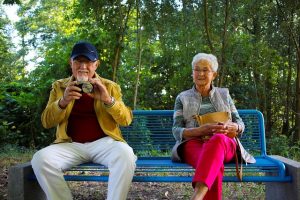
Q: How can the training and implementation of the adapted Montessori method of care equip us to meet the challenges that LTC owners and executives face as they prepare for the future in LTC? Additionally, it’s important to consider how the choice of care method is instrumental in our success in overcoming these challenges.
A: The adapted Montessori method of care, with its emphasis on respect, dignity, independence, and engagement through meaningful activities, directly addresses many of the challenges and questions long-term care (LTC) owners and management in Canada are facing as they prepare for the future.
Here’s how this method of care aligns with and provides solutions to the points raised:
- Demographic Changes

Tailored to Needs: The Montessori method can be adapted to meet the diverse and evolving needs of the aging baby boomer population, including those with cognitive impairments, by focusing on individual strengths and preferences.
- Quality of Care
Enhanced Quality of Life: Montessori-based activities improve residents’ quality of life by promoting independence, reducing agitation and depression, reducing medication, and increasing engagement and social interactions.
- Staffing
Staff Empowerment: Training staff in the Montessori method empowers them to engage residents in meaningful activities, which can increase job satisfaction and potentially reduce turnover rates.
Professional Development: Offering Montessori method training provides staff with valuable professional development opportunities, making the LTC facility a more attractive place to work.
- Technology and Innovation
 Complementary Technologies: Integrating technology with the Montessori method, such as using tablets for cognitive games or virtual reality for reminiscence therapy, can enhance care delivery and provide innovative ways to engage residents.
Complementary Technologies: Integrating technology with the Montessori method, such as using tablets for cognitive games or virtual reality for reminiscence therapy, can enhance care delivery and provide innovative ways to engage residents.
- Regulatory Compliance and Standards
Meeting Standards: Implementing the Montessori method can help LTC homes meet or exceed quality standards and regulatory requirements by providing a high standard of resident-centered relational care.
- Financial Sustainability
Cost-Effectiveness: The Montessori method can be implemented with minimal costs, using everyday items and focusing on training staff to create engaging environments without the need for expensive equipment or supplies.
- Emergency Preparedness
Adaptability in Crises: The Montessori method’s focus on individualized care and activity can be adapted even in emergencies, such as pandemics, to maintain engagement and routines despite changes in the environment or staffing.
- Ethical Considerations
Respecting Autonomy and Dignity: The Montessori method aligns with ethical principles by respecting the autonomy and dignity of residents, encouraging choice, and acknowledging the rights of residents to engage in meaningful life activities.
This approach enhances residents’ quality of life and contributes to a more sustainable, efficient, and compassionate long-term care system.
We’ll talk about all of this at the Toronto Conference on May 23, 2024 – Transforming Dementia Care: Embracing a Montessori Inspired Lifestyle®.
The Montessori Alzheimer Center is the authorized Canadian training partner of Dr. Cameron J. Camp – originator of the adapted Montessori method – and the Center for Applied Research in Dementia.
We offer training in the Adapted Montessori Method for individuals and groups of 6 or more in the same residence.
Contact Director Mark Norris with questions: [email protected]


